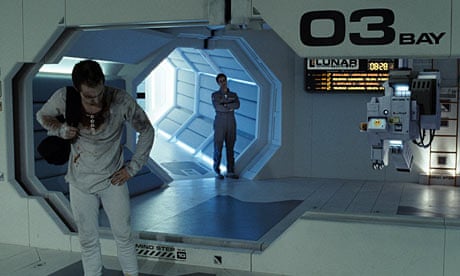The moon landing anniversary has been a time of nostalgia, for the glorious missions themselves and for the elegant, speculative and subversive sci-fi classics they inspired on screen in the next decade: 2001: A Space Odyssey, Solaris, Dark Star and Silent Running. Movie pundits now routinely affect to despise the all-consuming popular success of Star Wars in this context - but the cerebral, grownup strand of sci-fi was not destroyed.
Two years ago, Danny Boyle released his Conradian deep-space nightmare Sunshine, and now we have Moon, a heartfelt, if self-consciously derivative drama of human loneliness, which alludes to pretty much all of those classic films mentioned above. It is directed by first-time film-maker Duncan Jones, once known as Zowie Bowie, the son of pop legend David.
Moon is set in a future-world that has solved its energy crisis by mining fuel from the moon. Sam Rockwell plays Sam Bell, a guy with an eerie, lighthouse-keeper job. He is the sole human superintendent of the mechanised moon-mine, all alone in the tatty, mussed-up spaces of this lunar station, which have a weird 1970s design, eating his microwaved meals, exercising on the running machine, growing a beard and never reading a book. His only companion, in the traditional manner, is a faintly malign computer-helpmeet with an unreadably ironic voice provided by Kevin Spacey. No other actor could have conjured up the correct droll and enigmatic twang.
Sam is evidently coming to the end of his three-year tour of duty, a spell of solitary confinement that has very nearly driven him round the bend.
But then, on the very brink of freedom, something strange starts happening. He has visions of a dark-haired young woman in his kitchenette-area that freak him out and when he is driving across the gloomy, pitted moon surface in his big-wheeled truck (a lumbering craft pleasingly indebted to Gerry Anderson and Space 1999), he actually sees this vision again. Somehow, Sam gets back to safety on the main station, but thinks he overhears the robot talking to the corporate controllers via a satellite feed about a "problem" with the human employee. Could it be that Sam's trip back to earth might be on hold?
The strength of Moon is also, paradoxically, its weakness: its evocation of loneliness and the vast, silent reaches of outer space. Sam's daily routine is fascinating: three years, three whole years, doing nothing but that. But for the drama to advance, you need Sam to interact with someone - someone apart from a disloyal and mutinous computer, that is - and here is where the weakness lies. Sam does get to talk to someone, but in revealing who that person is, the film tips its hand and reveals its secret very early on. Probably too early.
Rockwell is very good, however, and it is nice to see a major role for a distinctive and engaging performer. As for the director, this smart little picture is a very serviceable launch pad.
